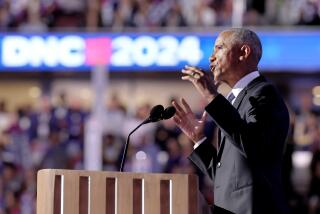Democratic Contenders Take Aim -- at Each Other
- Share via
For months, they pounded away at President Bush over the sagging economy. More recently, they have challenged his truthfulness about the case for war with Iraq. Now the Democrats who hope to replace Bush are broadening their target: They’re sniping at each other.
Connecticut Sen. Joe Lieberman is assailing Missouri Rep. Richard A. Gephardt’s health- care plan. Gephardt is criticizing Massachusetts Sen. John F. Kerry on trade. Kerry faults former Vermont Gov. Howard Dean for his lack of defense and foreign policy experience.
The fratricidal fire comes -- not coincidentally -- after the July 15 release of the latest campaign finance statements, which served as a kind of midyear report card on the presidential hopefuls.
Dean surprised many analysts by collecting the most money during April, May and June. Kerry finished second in fund-raising -- and has the most cash on hand -- but he and Dean now are squaring off for support from many of the same voters.
Gephardt fared poorly in the money-collecting contest, falling short of his second-quarter goal by about $1 million. Lieberman met his fund-raising expectations, but only after a last-minute scramble that ended with a shuffling of his campaign staff.
So with a sudden need to recalibrate their strategies, several candidates have seized on the same approach -- attack.
It is a way to “create conflict and drama,” said party strategist Jenny Backus, who likened the candidates to contestants on reality television. “You’re going to get more [exposure] on ‘The Bachelorette’ by picking a cat fight,” she said.
There have been earlier skirmishes. In May, at the candidates’ first formal debate, Kerry and Dean went at it from the start, resuming a fight Kerry had picked a few days earlier over Dean’s readiness to serve as commander in chief. Lieberman and Gephardt also mixed it up, along with North Carolina Sen. John Edwards, in a back-and-forth over Gephardt’s $2-trillion health-care proposal.
The reviews were largely negative, though, with some party leaders saying the tussles only diminished Democrats while leaving President Bush unscathed. Most of the candidates reverted to more gentlemanly form in the weeks that followed.
Recently, however, that reserve has eroded, as the contenders feel increasing pressure to break from a nine-candidate muddle.
“It’s an inevitable part of the process,” said Steve Elmendorf, a Gephardt strategist. “You’ve got a bunch of people running for president and you’ve got to convince people to ‘vote for me.’ And part of that process is explaining how you’re different from the other individuals. In some ways, I’m surprised it’s taken this long.”
At a recent Gephardt appearance in Iowa -- widely viewed as a must-win state for him -- he assailed Dean and Kerry for backing the North American Free Trade Agreement. The setting was a union hall, which was no accident -- NAFTA is anathema to organized labor, a key to Gephardt’s success in Iowa’s Jan. 19 caucuses.
A few days later, Lieberman took up the trade issue at a manufacturing plant in New Hampshire, criticizing “some Democrats” -- clearly Gephardt -- for “trying to build walls around our economy.”
In other instances, Lieberman has stepped up his criticism of Gephardt’s health-care plan -- calling it an ill-considered extravagance -- and gone after Dean for his opposition to the war against Iraq. He also has suggested Gephardt and Kerry were hypocritical for supporting last fall’s congressional resolution authorizing the war while now expressing concerns about the occupation.
In an interview, Lieberman said his criticisms were part of “a healthy discussion and differentiation” among the Democratic hopefuls.
“These nominating contests are truly struggles for the heart and soul of the party,” he said. “We would be irresponsible if we didn’t air our differences.”
There is also a more prosaic explanation.
“Both Gephardt and Lieberman need to shake things up if they’re going to survive,” said Charles Cook, an independent political analyst. “When you get into a corner, you need to attack.”
For Kerry, the calculation is likely somewhat different. After his brief dust-up with Dean in the spring, he has mostly sought to remain above the fray. Still, his New England neighbor poses an increasing threat, because both are counting on victory in New Hampshire’s Jan. 27 primary to launch their campaigns nationally.
So Kerry has taken a more subtle approach, an example of which was seen in a recent CNN interview. Asked about Dean, he brushed aside his rival, then proceeded to question Dean’s credentials without ever mentioning him by name. “I think we’ve learned that we don’t need a learning curve in the presidency on foreign policy and security,” Kerry said.
For his part, Dean continues to jab his rivals apace, his pugnacity unabated by his fund-raising success. Appearing in New Hampshire last week, he reiterated his criticisms of the war with Iraq and scoffed at fellow candidates expressing doubts about the administration’s post-war performance.
“We’re losing one or two soldiers a day in Iraq and President Bush never made his case” for the invasion, Dean said. “The time to question the president was not after we go to war.”
Not every clash rises to the level of war and peace.
This week, the Gephardt camp seized on a Chicago Tribune story that recounted his visit with a New Hampshire household. Gephardt shook hands with the family pet, which Dean had ignored when he stopped by.
“Howard Dean hates dogs!” read an e-mail alert from the Gephardt team.
Dean strategists quickly responded with not one, but two, photographs of dogs sporting Dean paraphernalia. “Gov. Dean’s canine constituency service has already prompted a four-legged groundswell across America,” Dean aide Tricia Enright said in an accompanying statement.
More to Read
Get the L.A. Times Politics newsletter
Deeply reported insights into legislation, politics and policy from Sacramento, Washington and beyond. In your inbox three times per week.
You may occasionally receive promotional content from the Los Angeles Times.











